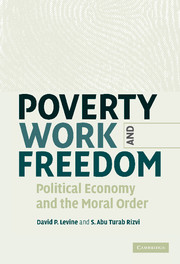7 - Work and freedom
Published online by Cambridge University Press: 22 September 2009
Summary
Work
In a setting where the classical economist's notion of subsistence applies, to be poor means to be unable to lead a life appropriate to a defined social position. Occupying such a position carries the meaning of existing for others, specifically for the community. If we use the term poverty to characterize those who lack something vital for living, in this setting poverty refers to the lack of a vital connection to the community. The poor are those who have been excluded from the community, or they are those whose community has somehow failed.
As we have suggested, this idea becomes difficult to apply where we deal not with members of a community, but with individuals, not with need defined by social position, but with individual need. Here, if poverty refers to a lack, it cannot be the older connection with the community that has been lost. Rather than referring to the failure of the connection with community, poverty now refers to a failure in the shaping or maintaining of an individual identity. While this identity may incorporate attachment to a group, this attachment is chosen rather than ascribed, and the individual seeks the group not to find an identity, but to express and realize it.
Associated with individual identity are a set of appropriate beings and doings. Focusing for the moment on doings, we can consider poverty the inability to make what we do in life an expression of our individual identity.
- Type
- Chapter
- Information
- Poverty, Work, and FreedomPolitical Economy and the Moral Order, pp. 78 - 94Publisher: Cambridge University PressPrint publication year: 2005

